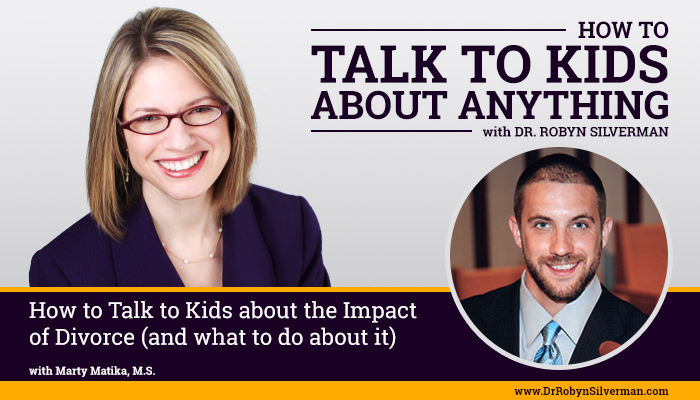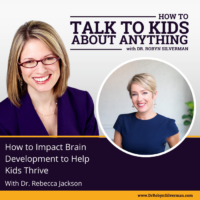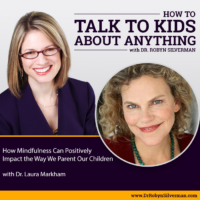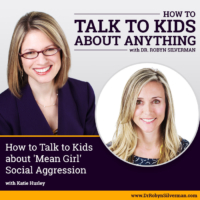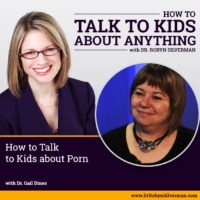Podcast: Play in new window | Download
Subscribe: Apple Podcasts | RSS | More
How to Talk to Kids about the Impact of Divorce
This podcast will focus on how to help kids cope with the impact of divorce. Marty Matika goes over the warning signs that might tell you that your kids are suffering during divorce (but not telling you about it), the top mistakes parents make while going through a divorce, and what kids really wish their parents knew while their family was going through a divorce. As a child who went through divorce as well as a therapist/coach who helps kids and families who are going through divorce, Marty Matika has personal insights that can help parents who are experiencing divorce right now.
Special Guest: Marty Matika
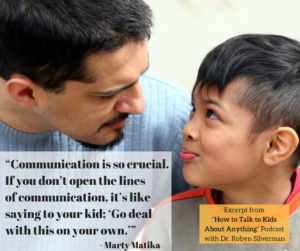 Divorce can be tough on kids. And with over half of marriages ending in divorce, lots of kids are experiencing divorce in their families. What does it feel like? What do kids of divorced parents wish their parents would do or wouldn’t do? What are the top mistakes parents make while going through a divorce? To answer these questions, we have Marty Matika on the show today—and with good reason.
Divorce can be tough on kids. And with over half of marriages ending in divorce, lots of kids are experiencing divorce in their families. What does it feel like? What do kids of divorced parents wish their parents would do or wouldn’t do? What are the top mistakes parents make while going through a divorce? To answer these questions, we have Marty Matika on the show today—and with good reason.
Growing up in a very tough childhood as a Child of Divorce, Marty has a mission to help other young people going through the process and help them deal with the challenges that arise. Marty has a ONE OF A KIND ability to connect with Teens and Young Adults and has a special gift for helping them break through their barriers and create what they want for their lives. Marty is doing one on one work, group work, speaking engagements and his “Overcoming Teenage Challenges” workshop in the Philadelphia Area. You can learn more about Marty Matika and divorce at Life-Circles.com
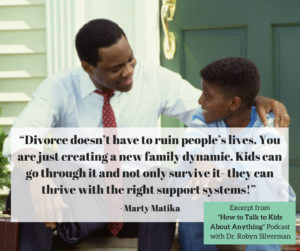 The podcast provides:
The podcast provides:
- Tips: How to help kids going through divorce
- Top 5 Warning signs that a child is suffering during parental divorce
- Top mistakes parents make during separation and divorce
- What kids really wish their parents knew that divorce is happening.
- Scripts: How to open up lines of communication with your child
Important Messages:
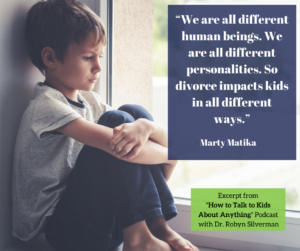
- Many kids do not want to burden their parents and siblings with their tough feelings.
- Children want someone outside of the family to talk to so that they can be honest and open—especially when they don’t want to burden their parents. (And not to mention, some kids feel that their parents are “causing” the problem, so how can they talk to them about it?)
- Many kids shut down and close down their feelings during divorce. Others act out to get extra attention- given that children whose parents of divorce sometimes don’t get as much attention from each parent during this stressful time.
- Some kids going through divorce get in trouble at school or in the community while others have a percolating anger.
- Kids going through divorce can often feel they have to do all this on their own.
- While children may learn to be more independent during divorce, if they shut down and try to do everything by themselves, they may have trouble sharing their feelings and collaborating to make progress.
- Both parents need to commit to working amicably so that their kid gets through the divorce and thrives. Kids need this.
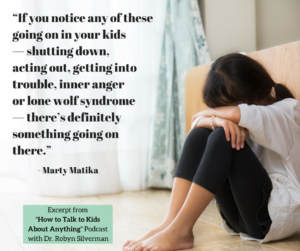 Don’t say negative things about the other parent- it can manipulate the child- and then ultimately backfire.
Don’t say negative things about the other parent- it can manipulate the child- and then ultimately backfire.- Go out into nature, do yoga, write in a journal, do some art, go to the gym or join a support group. Find something you love to do in order to take care of yourself.
- Find a professional who offers a different perspective- there are many people out there who want to make this process easier for you and everyone involved.
- If you can’t figure out how to bridge the gap between you and your ex-spouse, bring in a mediator to help so that you come together to do what’s best for the child. The main point is that we want to take care of our child.
- When it comes to seeing new people, take your time! Don’t shut your life down- but keep it out of the home until your child can understand and give the new person a chance.
Notable Quotables:
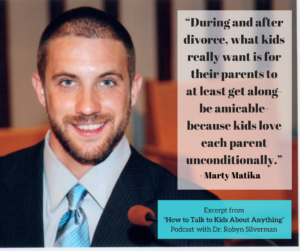 “We are all different human beings. We are all different personalities. So divorce impacts kids in all different ways.”
“We are all different human beings. We are all different personalities. So divorce impacts kids in all different ways.”- “If you notice any of these going on in your kids—shutting down, acting out, getting into trouble, inner anger or lone wolf syndrome—there’s definitely something going on there.”
- “When going through divorce, parents need to ask themselves; ‘What is my commitment?’ Both parents need to be committed to having their kid thrive and get through this. Maybe they don’t even like each other but they need to be more amicable because they both love their child.”
- “During and after divorce, what kids really want is for their parents to at least get along- be amicable- because they love each parent unconditionally.”
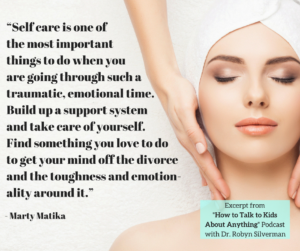 “Self care is one of the most important things to do when you are going through such a traumatic, emotional time. Build up a support system and take care of yourself. Find something you love to do to get your mind off the divorce and the toughness and emotionality around it.”
“Self care is one of the most important things to do when you are going through such a traumatic, emotional time. Build up a support system and take care of yourself. Find something you love to do to get your mind off the divorce and the toughness and emotionality around it.”- “Parents make mistakes. We are not perfect. Own your mistakes and do whatever you can to clean them up.”
- “The communication is so crucial. If you don’t open the lines of communication, it’s like saying; ‘Go deal with this on your own.’”
- “Divorce doesn’t have to ruin people’s lives. You are just creating a new family dynamic. Kids can go through it and not only survive it- they can thrive with the right support systems.”
Resources:
- http://www.Life-Circles.com (Ebook: The Top 5 Warning Signs to Notice in a Young Person Going through Divorce is accessible through the website)

